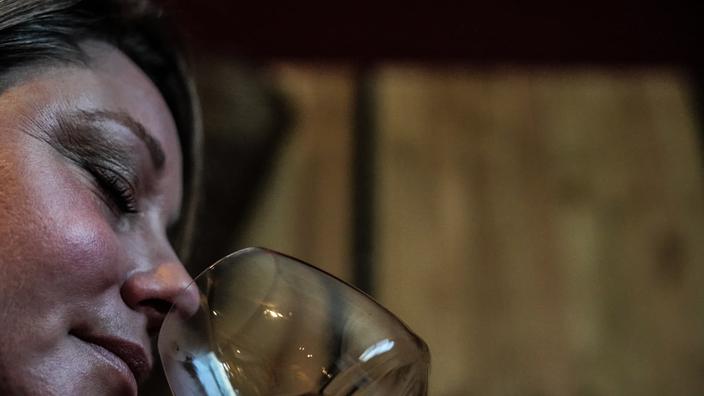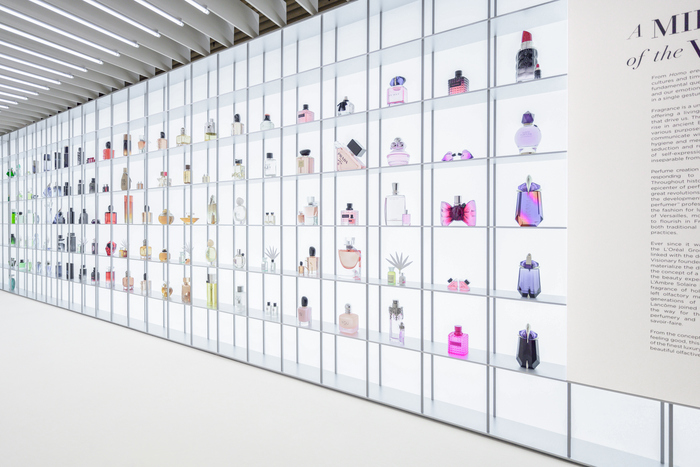"But will it come back doctor?"
"..."
Maybe.
Maybe not."
With the door of the ENT office slammed, Johanna Welter rushed in tears to the Chant du Vin, the cellar of a loved one, in the Parisian suburbs.
When you are trained as an oenologist, you have a lot of friends in the industry.
Then comes the cursed day when you lose your sense of smell.
In the midst of these bottles which only inspire her with disgust, the forty-something has poured out her sorrow.
“I tested positive for the coronavirus on March 23.
I lost the smell and the taste.
In one day, the world has become like tiles.
A blank sheet. "
Johanna is one of the 10% of French people who have permanently lost their sense of smell after Covid-19.
By an interdependent effect, the taste also disappears.
While February 27 marks World Anosmia Day, this handicap remains largely unknown.
In one year, Johanna has performed dozens of unsuccessful scans and medical appointments.
This owner of a hotel-restaurant in Arpajon (91) has given up developing the menus and the wine list, reduced to
“unbearable vapors of ethanol”.
But the evil does not end there.
“It's very complicated morally.
I gained 10 kilos because I overcompensated
, sighs Johanna.
The smell of chocolate cake, the smell of butter coming back to the pan ... I don't remember.
I feel like a part of me is dead. ”
To read also: "I understood that I was concerned by the Covid long"
A suffering shared by William Lemaître, baker in Picardy.
This tall guy weighing 115 kilos, a pillar of rugby, boasted of having defeated the coronavirus in September without collateral damage.
Until that smell and taste disappeared.
Volatilized.
It is regrettable, for this cook, to have
"burned a dozen pizzas"
and to
"give up seasoning salads"
.
Worse still is the arrival of spring.
Every man has his weaknesses, and that of this savvy tackler, it's strawberry season.
Each year he tastes them carefully before adding them to his pies.
And then there's the meat, his other cute sin.
But now he must endure an abominable
"smell of sulfur, with a texture of cardboard."
William pauses
.
“But what I miss most is the smell of my son.
You imagine ?
I forgot my kid's perfume. ”
Johanna Welter at the Chant du Vin, in Arpajon.
Coline Renault / Le Figaro
"
Wait
", repeat the doctors as an admission of helplessness.
“When you become anosmic, you enter a world where there is no information, almost no scientific literature.
Nobody knows anything ”
, observes Jean-Michel Maillard, deprived of the sense of smell since a bad fall three years ago.
He is the president of the Anosmie association, one of the few organizations in the world specializing in this deficiency.
“The French discovered that they had a nose last March.
The olfactory culture is almost non-existent in France.
When the covid arrived, we were not ready, ”he
laments.
No one sees the point of smell, until the day it disappears
Jean-Michel Maillard
Anosmia is not recognized as a handicap: at school, children's sense of smell is never checked.
How to explain, in the land of perfume and gastronomy, this lack of interest in this sense of the nose?
“From antiquity, we considered the gods as perfumed smoke and men as nauseating beings.
The West has always relegated the sense of smell to bestiality, as opposed to the senses "of the mind": sight and hearing, "
analyzes sociologist Brigitte Munier, author of"
Odors and perfumes in the West: who does the angel plays the beast
”(Éditions du Félin).
The sense of intimacy and emotion
Olfaction has neither the lucidity of sight nor the certainty of touch.
Incernable, impalpable, it cannot be rationalized, it cannot be described.
And yet, it is infinitely necessary for memories and emotion.
“Smell is the sense of intimacy in the world,”
explains Jean-Jacques Maillard.
"Nobody sees the point in it, until the day it disappears."
The “
Madeleine de Proust
” is less a literary coquetry than a physiological reality.
“The area of the brain that processes olfaction is the same as that of memory and emotion, unlike the other senses,”
explains Claire Martin, neurobiologist at the CNRS.
“The Covid destroys the olfactory mucosa and disrupts the neurons responsible for transmitting the electrical signal.
The brain therefore no longer knows how to perceive smells, and, retroactively, taste. ”
At the Superior School of Perfume, students are trained in post-Covid olfactory rehabilitation.
Coline Renault / Le Figaro
Reclaiming the sense of smell
Therapies exist all the same.
In the office of Doctor Duc Trung Nguyen, at the Nancy CHRU, Nathalie Stumerly shows a big smile.
"The smell of strawberries is back," she
triumphs with the otolaryngologist.
A small victory, after four months of olfactory therapy to try to find the meaning lost as a result of the Covid, in March 2020. Four months of breathing “
desperately
”, morning and evening for ten seconds, scents of cloves, eucalyptus , rose and lemon.
“The challenge is to re-educate the mucosa for perception, and then to reactivate memory to achieve identification,”
explains the doctor.
Few specialists in France are trained in olfactory rehabilitation;
Duc Trung Nguyen has been running from congress to congress for a year.
“I have been working on this issue for ten years.
I couldn't find laboratories to provide me with rehabilitation kits.
And all of a sudden, everything is accelerating, ”
he says.
Perfumers are panicked at the idea of losing their smell.
It's taboo in the profession
Chantal Artagnan, director of the Higher School of Perfume
At the École supérieure du parfum, conservatory of aesthetic scent and temple of noble fragrances, health was invited into the programs when the virus entered the doors of the establishment.
“Perfumers are panicked at the idea of losing their smell.
It is taboo in the profession.
Very quickly, it became obvious to us to take a position on this issue, ”
explains Chantal Artagnan, the director of the establishment.
The school has developed a smell recovery protocol based on the OSTMR method, which combines medicine, psychology and perfume.
“I recreate olfactory stimuli based on personal memories with a palette of 80 scents.
Memory forces the brain to reactivate smell and reconfigure neurons, ”
explains Félicie Codron.
His first guinea pig?
She herself, suffering from almost total anosmia after contracting Covid-19 despite all precautions to protect her nose from the virus.
“
Smell is not just about smelling good.
It is to feel alive ”
, continues the young woman.
"When he returned, I had tears in my eyes."



/cloudfront-eu-central-1.images.arcpublishing.com/prisa/MQPLNP4GFRGSTNSIE5S7UBSP64.jpg)











